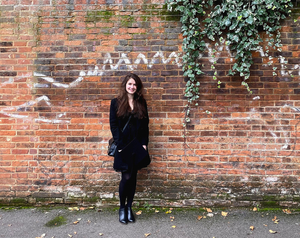Lize Alberts
Interests
Topics
- Human-Centred Artificial Intelligence
- Large Language Model Alignment and Evaluation
- The Ethics of Interaction/Behavioural Design
- Wellbeing- and Autonomy-Supportive Technologies
Fields: Human-Centred Computing; Cognitive and Computational Linguistics; Human-Computer Interaction (HCI); Behavioural Design; Human-Robot Interaction (HRI); Cognitive Science; Social Psychology; Technological Governance; Natural Language Processing/Understanding (NLP/NLU); Social Anthropology; Responsible Innovation; AI/Technoethics; Philosophy of Language and Cognition
Biography
Lize is a doctoral candidate in the Human Centred Computing group, co-supervised by Prof. Max van Kleek and Prof. Marina Jirotka. Her doctorate is funded by a Graduate Lighthouse Scholarship from the Responsible Technology Institute.
Her research centres on building a novel theoretical framework regarding interactional ethics, with a primary focus on systems that behave as social actors (i.e., any system that "talks" to/at users). Her work involves exploring, with end-users, what it means for algorithmic systems to treat users respectfully, and the sorts of harms and expectation violations that may arise in human-computer social interaction. Her focuses include supporting users' sense of autonomy, competence and overall wellbeing, as well as identifying inappropriate uses of social/anthropomorphic cues in interface design (e.g., as dark patterns).
Before starting her DPhil, Lize graduated with distinction with a master's by thesis in Philosophy from Stellenbosch University, focusing on embodied cognition and computational linguistics. Her master's thesis critically integrates literature in cognitive science, cognitive linguistics, evolutionary psychology, and philosophy to investigate the embodied factors involved in human concept acquisition and language learning. Comparing this against a review of technical approaches in Natural Language Understanding (NLU) in AI, it conceptually analyses and distinguishes different senses of language `understanding', and considers opportunities for artificial language comprehension using multi-modal concept grounding.
She also holds a BA Honours degree in Philosophy and had her dissertation on computational linguistics published in a peer-reviewed journal. Preceding that, she graduated top of her class with a BA in Humanities whilst taking twice the required subjects, achieving distinctions across all four majors.
Lize is a Research Fellow at the Unit for the Ethics of Technology at Stellenbosch University's Centre of Applied Ethics. She is also a founding member of the Responsible Technology Institute's Student Network, and recently worked for three months as Student Researcher at Google UK on the evaluation of generative AI and agentic language agents.
Selected Publications
-
Computers as Bad Social Actors: Dark Patterns and Anti−Patterns in Interfaces that Act Socially
Lize Alberts‚ Ulrik Lyngs and Max Van Kleek
In Proc. ACM Hum.−Comput. Interact.. Vol. 8. No. CSCW1. April, 2024.
Details about Computers as Bad Social Actors: Dark Patterns and Anti−Patterns in Interfaces that Act Socially | BibTeX data for Computers as Bad Social Actors: Dark Patterns and Anti−Patterns in Interfaces that Act Socially | DOI (10.1145/3653693) | Link to Computers as Bad Social Actors: Dark Patterns and Anti−Patterns in Interfaces that Act Socially
-
Should agentic conversational AI change how we think about ethics? Characterising an interactional ethics centred on respect
Lize Alberts‚ Geoff Keeling and Amanda McCroskery
2024.
Details about Should agentic conversational AI change how we think about ethics? Characterising an interactional ethics centred on respect | BibTeX data for Should agentic conversational AI change how we think about ethics? Characterising an interactional ethics centred on respect
-
Designing for Sustained Motivation: A Review of Self−Determination Theory in Behaviour Change Technologies
Lize Alberts‚ Ulrik Lyngs and Kai Lukoff
2024.
Details about Designing for Sustained Motivation: A Review of Self−Determination Theory in Behaviour Change Technologies | BibTeX data for Designing for Sustained Motivation: A Review of Self−Determination Theory in Behaviour Change Technologies

